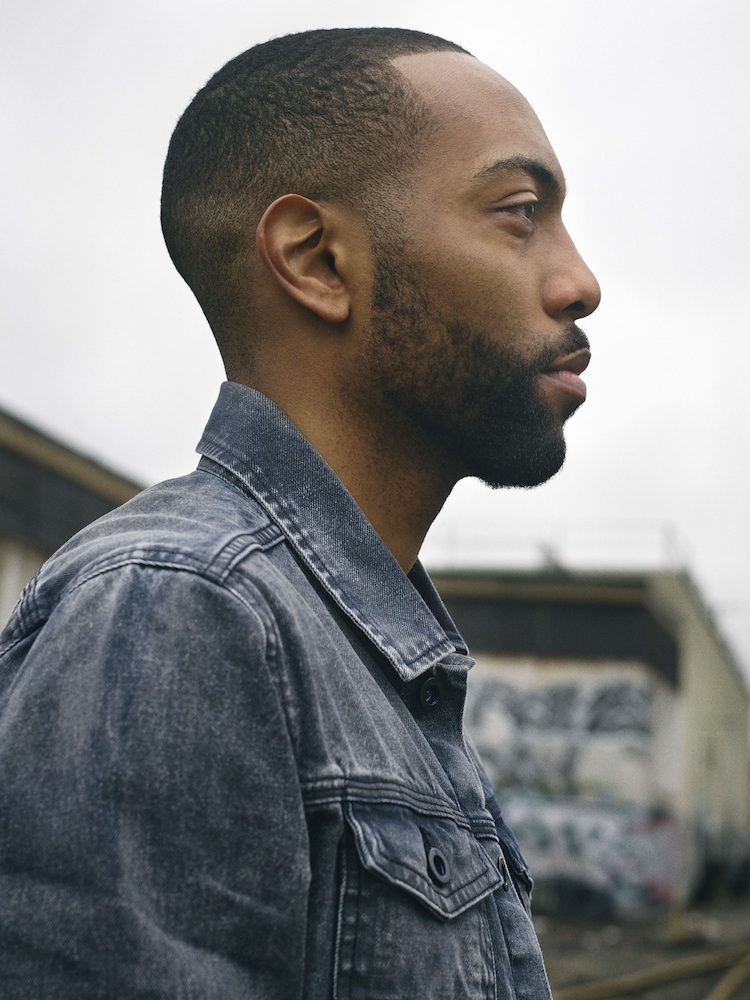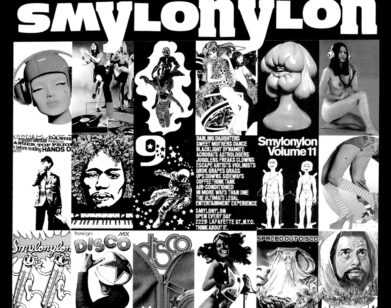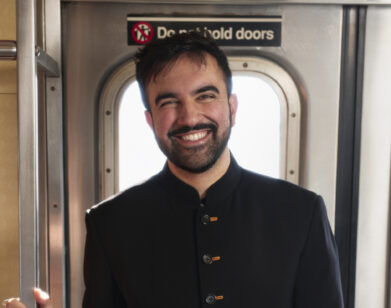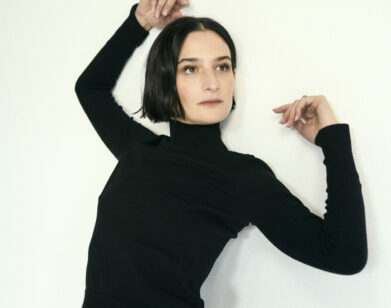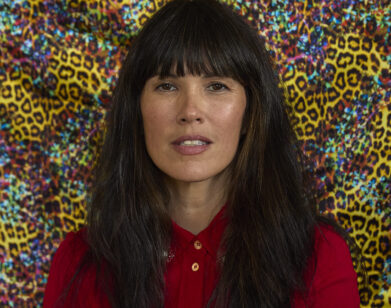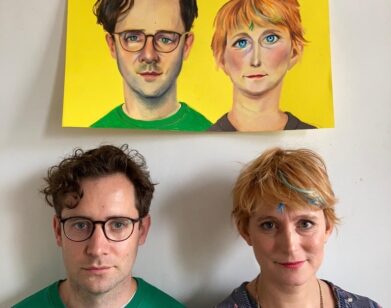Discovery: Jeremie Harris
JEREMIE HARRIS IN NEW YORK, JANUARY 2017. PHOTOS: MATTHEW SPROUT/EXPOSURE. STYLING: MARINA MUÑOZ/LALALAND ARTISTS. GROOMING: NATE ROSENKRANZ FOR YSL BEAUTY/HONEY PHOTO ASSISTANTS: JORDAN STRONG AND MIKE BOGART. STYLING ASSISTANT: ELLEN PURTILL.
In Legion, Noah Hawley’s new Marvel series on FX, Jeremie Harris plays “memory artist” Ptonomy Wallace. When we first meet Ptonomy, he is a stark contrast to the show’s hero David Haller (Dan Stevens); where David is chaotic and uncontrolled—a mess of adolescent powers—Ptonomy is calm beyond his years. “One of the directors for the show, I like the way he described it: ‘Think of Ptonomy as a 70-year-old man. He’s seen so much and experienced so much,'” Harris explains. “He does have a very straightforward way of saying things; he says what he means, but in the way that an older person does. Many things that younger folks are worried about, I think that he doesn’t let them affect him,” he continues.
Raised just outside of New York City in New Rochelle, Harris made his acting debut in writer-director Dee Rees‘s first short Orange Bow (you can find him in two of Rees’s subsequent features, Pariah and Bessie). Since graduating from Julliard, he’s acted in a handful of independent films (the most recent of which, Bushwick, premiered at the Sundance Film Festival last month), Baz Luhrmann’s series The Get Down, and plays at the Public Theater. Indeed, it was his performance in Suzan-Lori Parks’s Civil War drama Father Comes Home From the Wars, and a subsequent phone call from the Public’s Artistic Director Oskar Eustis, that led Harris to apply for and win an Annenberg Arts Fellowship last year.
Outside of acting, Harris is an accomplished poet who has collaborates with jazz musicians (and fellow Julliard grads) Kris Bowers and Samora Pinderhughes. “There’s no artistic integration between the musicians and actors within the course work, but I lived in the dorms, so you all see each other and know each other,” Harris recalls. “I cut Jon Batiste‘s hair—he was there when I was there, and his bass player was my roommate my freshman year…you end up meeting people and you just connect.”
HOMETOWN: New Rochelle, New York.
EARLY AMBITIONS: Growing up, I wanted to go to the NBA. I was a big fan of Penny Hardaway, Allen Iverson, Stephon Marbury. I played a lot of sports, but that was the sport that I fell in love with, and that was what I thought I wanted to do for a long time. I went to basketball camps and I tried to be serious about it. Then I didn’t become 6’6″ and have a 40-inch vertical, and all those things started to make me realize, “This is probably not going to happen.” I realized, probably my junior year of high school, that I should think about other things.
Then, I was like, “Okay, maybe I’ll be a music mogul.” I was really into, at that time, this guy Damon Dash. It was Damon Dash and Puff Daddy, who’s Diddy now. Those people were an inspiration for me. I did an internship at Def Jam one summer, but I was on the street team. This was pre-Instagram, pre-the amount of online promotional tools [we have today]—it was when you’d go around the city stapling posters of people’s albums coming out. I did that for a summer until one day, we were in Harlem at Rucker Park, which is a very famous street ball park on 155th and 8th Ave. I was sniping these posters, which was illegal, and the cops came. Everyone else disappeared, and I was young—I was probably 15—and I was like, “Yo, where’d everyone go?” The cop grabbed me and he was just like, “What are you doing? These people you’re doing this for, they don’t care about you.” He just let me go with that statement. Other things happened in the office, but that was a really cutthroat business, the music industry. I guess a lot of entertainment is, but especially at that age, I wasn’t prepared for that. I was like, “Damn, this is really intense.”
INTRO TO ACTING: You could supplement half a semester of English, or something like that, to do some other thing outside, so I decided to take an acting class. I was really into it, and they had me audition for this Disney movie Sky High [2005]. I came really close to booking something in it, and I was like, “Maybe this is something that I could do that I’ll be good at.” By this time I was already going to NYU, so I’d spent a little time at NYU studying business. I started working at this summer theater program at the Classical Theatre of Harlem, and that’s where it really got more serious for me. I played Murderer #1 in Macbeth, the Scottish Play, and I was around a lot of actors who went to programs like Juilliard and NYU Grad Acting and Yale School of Drama. I left NYU early to go to Julliard.
FIRST SHORT: I did a short film with this director Dee Rees, who’s amazing. My first year at NYU—either the summer or right before classes start—she was in the grad film program and was casting her short film called Orange Bow. That got into the Tribeca Film Festival, and it was a series of things that built up my confidence.
FROM A PASSTIME TO A PROFESSION: I come from a much more education[-focused background]. My sister has an MBA from Harvard; I’m the only one of my siblings who didn’t go to an Ivy League school. My mother’s an immigrant [from Dominica], so [I grew up with] that immigrant idea of there are certain things you do. After I did Orange Bow, I told my mom I wanted to study acting, and she was like, “I’m not paying for you to go to school and study acting” and hung up the phone on me. She called me back 30 minutes later: “I’m sorry, I’ll support you in whatever you want to do.” But just to give you the idea that I didn’t have many professional artists in my family.
I stayed in touch with the Classical Theatre of Harlem while I was at NYU, and I tried to do things there. They did this play, Waiting for Godot, with Wendell Pierce, who was in The Wire. He was really supportive and he brought me to the set of this HBO movie he did with Queen Latifah, Life Support [2007]. He went to Juilliard and he started mentoring me a little bit. [Between that], the Tribeca Film Festival, and the experience I had working with Dee, it gave me enough confidence to say, “I want to do this, but I want to train.”
THE JULLIARD YEARS: It’s a great program and not as difficult, I think, as being in the business. Being in the business, there are so many ups and downs: “They really like you for this,” and you think it’s going to happen, but then it doesn’t happen, and just starting out and trying to build your name and how hard it is. All those things were more difficult than anything I experienced at Julliard. It’s a place with super ambitious and focused people, and the lore of it at first scares you, you’re like, “How did I get in here? Am I even good enough to be here? Are they going to hate my work?” The cut system was gone by then—they used to have a cut system—but you were still afraid, “Am I going to be able to make it here?”
I did have a good experience, and I think the best part is just working all the time, acting all the time, and having people watch your work. But at the same time, you have critiques at the end of every project that you do, and that can be difficult. You have these people who you really respect—they’re the people who decided you could come to this school—telling you, “You need to work on this, you need to work on that.” They talk about how dedicated they think you are, the type of work you did, the limitations they think you have as an actor. I think it’s okay, depending on how you take it. So many people love the idea of being at Juilliard so much that they take these teachers’ words for god, when you have to take everything with a grain of salt. I think when you’re a young artist trying to figure things out, school can also in some ways get in the way of that, because you want to be free to do what you want, and all your roles are assigned to you.
FIRST FEATURE: It was this movie with Robin Williams and Mila Kunis called The Angriest Man in Brooklyn. It was cool to work with Robin Williams. I obviously didn’t know he was going to pass away. We were in the makeup trailer and I was like, “Hey, I just want to let you know I went to Julliard too.” And he was like, “Oh… That place. How was it?” He had kind of a cool, humorous remark and I told him about some of the teachers, but I don’t think anyone was the same, and that was it. But the best part about working with him was seeing someone who was so accomplished and so revered deal with the same things that every actor deals with: consulting with the director, figuring things out, working things through for himself. It made me realize that this is just a part of being a craftsman. As much as you do it, you’re always going to still need to get down to the basics of, “What is this about? What am I doing here? What do I want?”
GETTING CAST IN LEGION: I ended up on the show The Get Down, and the same casting director for The Get Down, Ronna Kress, cast Legion. I guess she was watching my dailies on The Get Down and she reached out to my reps and said, “I want Jeremie to read for this role in this new Noah Hawley/Marvel/FX project.” Obviously, when I saw Noah Hawley, Marvel, and FX, I was like, “This is amazing.” All of those brands—I don’t know if Noah considers himself a brand, but Noah and those two brands have such great taste and do really great work. So I was excited and I put myself on tape. It was kind of simple from there; Ronna showed it to Noah, Noah loved it, and then it was getting the network on board. They used the first tape I sent for the entire process, so I never had to re-tape. The waiting was tough, obviously, because I’ve heard so many times, “They really like you for this. They really want you,” and then with the nature of the business, it goes another way. For it to actually come through was really exciting, and for it to be a project with this level of creative talent involved, it was just one of those things where the right things come to you when they’re supposed to.
CHARACTER APPEAL: I’m really attracted to characters who are outsiders. I don’t know if I consider myself an outsider—when I meet people, I don’t think I come off as, “You’re this weird guy that I’m afraid to talk to.” I think I’m approachable. I just think throughout my life, I’ve always been the other in a space, whether it was being in advanced classes, or that I grew up in a super, super religious household. I’m not religious anymore, [but] I would go to Bible camps in Pennsylvania, in Guyana, all these unique experiences that made me feel different. Growing up that religious and having that background is a weird thing, especially because it didn’t feel right to me, even when I was growing up.
PTONOMY WALLACE: After I booked the show, I spoke to Noah, and he just talked to me about Ptonomy being a memory artist and remembering everything that happened in his life. He wanted me to think about the complexity of that, how much of a burden that can be to never let go of any traumatic thing that ever happened in your life, versus something that may be really cool. Also the idea that I can go into other people’s memories and see so much of what other people have experienced in their life that they may never share with anyone else, and how that can affect a person.
There’s more of that Zen energy there. I do think that through the season as he spends more time with David, he realizes, “Okay, this is someone who I’ve never encountered before,” which makes this interesting. That builds as the series goes along.
SEASON ONE OF LEGION AIRS WEDNESDAY NIGHTS ON FX.

